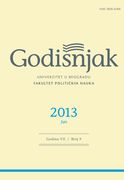Tumačenja o odnosu islama i demokratije, dometi arapskog proleća
Interpretations on the Relationship Between Islam and Democracy: Achievements of the Arab Spring
Author(s): Nikola LakićSubject(s): Politics / Political Sciences
Published by: Fakultet političkih nauka Univerziteta u Beogradu
Keywords: Islam; democracy; historicism; rent-seeking; crony capitalism; Arab Spring; path-dependance; security sector reform
Summary/Abstract: The general hypothesis determines that the political obstacles caused the democratic deficit in the Arab world. The lack of democratic traditions in Arab societies is not correlated with the Islamic culture, but primarily with the patterns of state formation, the institutional legacy of authoritarianism and economic model of crony capitalism. The relationship between Islam and democracy is more a matter of competing readings of religious texts than theological and philosophical considerations. The assumption about the influence of Islam on the outcome of the Arab Spring is limited again. Egypt's Supreme Constitutional Court is recognized by a progressive interpretation of Islamic law using distinctive and idiosyncratic version of modern reasoning. In the field of religious questions the extent to which the new government in Tunisia should go only means restoring the lost independence of religious institutions and education. Arab Spring exposes the real structural causes of the democratic deficit contained of interrelated military-political and economic factors.
Journal: Godišnjak FPN
- Issue Year: 2013
- Issue No: 09
- Page Range: 135-156
- Page Count: 22
- Language: Serbian

